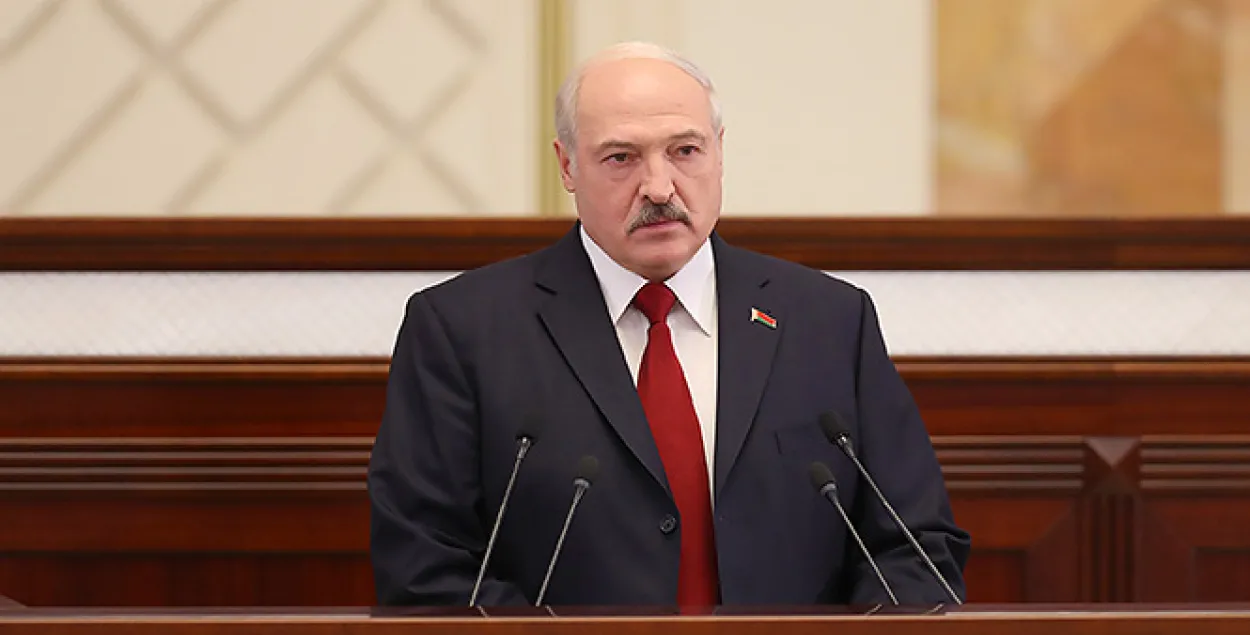Lukashenka in hot water over calling 2019 parliamentary election

Alyaksandr Lukashenka / screenshot from video
By his proposal to hold the election to the House of Representatives on Thursday, November 7, 2019, Alyaksandr Lukashenka reduced the term of MPs in the parliament by 10 months. Opposition United Civil Party's MP Hanna Kanapatskaya and human rights activist Uladzimir Labkovich said that this decision violates the Constitution of Belarus.
But the chairman of the Central Election Commission, Lidziya Yarmoshyna, believes that there is no violation. She has spoken about a more convenient date for the parliamentary elections -- November 17, 2019. To the question about Lukashenka biting off more than 20% from the four years of parliamentary term Yarmoshyna said the following:
"Well, what can you do, it happened this way."
What are the arguments of the officials?
Calling the elections to the House of Representatives in 2019 is based on the Article 91 of the Constitution of Belarus:
“The election of the new composition of the Chambers of Parliament is called no later than four months and are held no later than 30 days before the termination of the current convocation term.”
No later than 30 days can be both 31 days and 10 months before, officials say, since there is no specific timeframe in Article 91 of the Constitution.
What does Labkovich and Kanapatskaya object to?
Article 93 of the Constitution says: “The term of office of Parliament is four years”.
Thus, the term of MPs of the sixth convocation ends on September 5. Simply cutting it with the words "well, what can you do" would be a violation of the Constitution, Uladzimir Labkovich is convinced. The parliamentary and presidential election campaigns, which both fall for 2020, can be brought apart without violating the Constitution.
Is it possible to hold early election to the House of Representatives?
Yes, it is. The Constitution indeed allows for the early dismissal of the House of Representatives and the holding of early election. Here's what the Article 93 of the Constitution says:
“In the cases and in the manner prescribed by the Constitution, the powers of the House of Representatives or the Council of the Republic may be terminated early.”
Article 91 defines the conditions for holding such an early election:
“The extraordinary election to the chambers of parliament is held within three months from the day of the early termination of the powers of the chambers of parliament.”
However, one needs to have compelling grounds to dissolve the House of Representatives before its powers end. These (as well as the grounds that make the dissolution of the House of Representatives impossible) are set forth in Article 94 of the Constitution:
“The powers of the House of Representatives can be prematurely terminated if they refuse to trust the Government, express a vote of no confidence in the Government, or twice refuse to give consent to the appointment of the Prime Minister.
The powers of the House of Representatives or the Council of the Republic may also be terminated early on the basis of the opinion of the Constitutional Court in the event of systematic or gross violation of the Constitutions by the chambers of Parliament.
The President takes decisions on these matters no later than two months after holding official consultations with the chairs of the chambers.
Chambers may not be dissolved during a state of emergency or martial law, during the last six months of the presidency, during the resolving of the issue of the early release or removal of the President from office.
The dissolution of chambers within a year from the date of their first sessions is not allowed. ”
Can the “new” MPs elected in 2019 simply wait for September 2020, when the powers of the “old” MPs end?
According to Article 93 of the Constitution, they cannot.
“The session of the newly-elected Houses of Parliament is convened by the Central Election Commission for Republican Referendums and begins its work no later than 30 days after the elections.”
The countdown of these 30 days begins on the day of the election. Thus, the deputies elected on November 7 must begin work no later than December 7, 2019.
What will happen if Lukashenka issues a decree on parliamentary elections in 2019?
The view of Lidziya Yarmoshyna may prove more preferable to Alyaksandr Lukashenka than the arguments of Hanna Kanapatskaya and Uladzimir Labkovich. In this case he will issue a decree on holding the parliamentary election in 2019.
Such a decree may be challenged by the Constitutional Court. But in order to start the inspection, it must receive the corresponding request. And only five entities have the right to appeal to the Constitutional Court: the President, the Government, the House of Representatives, the Council of the Republic, the Supreme Court. None of them, including the House of Representatives, will contact the Constitutional Court about the appointment of the election date, Hanna Kanapatskaya is convinced.


















